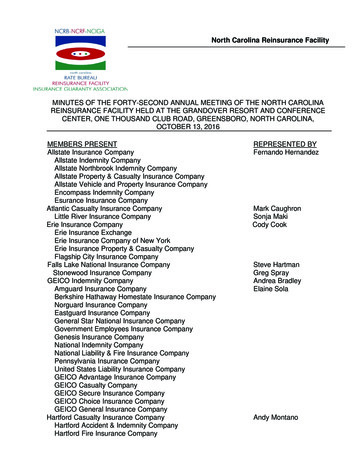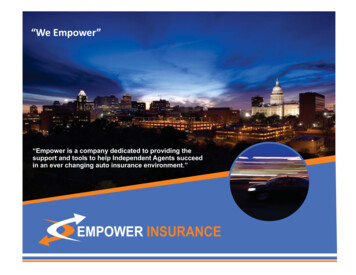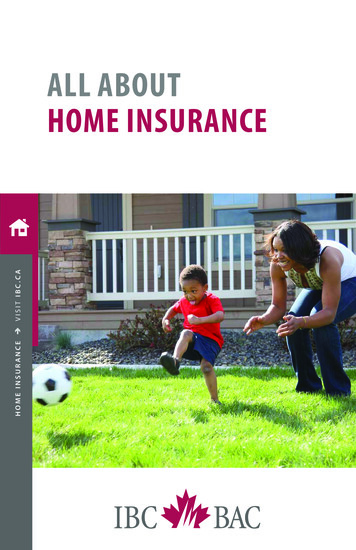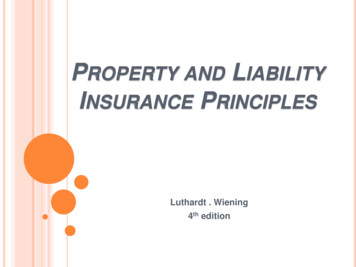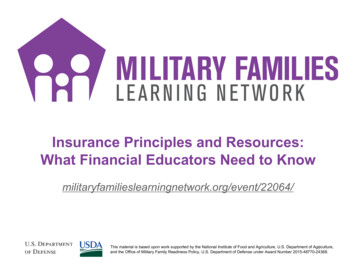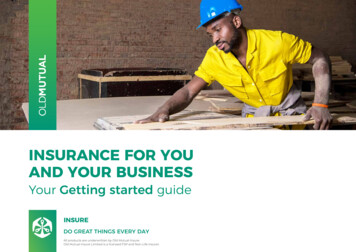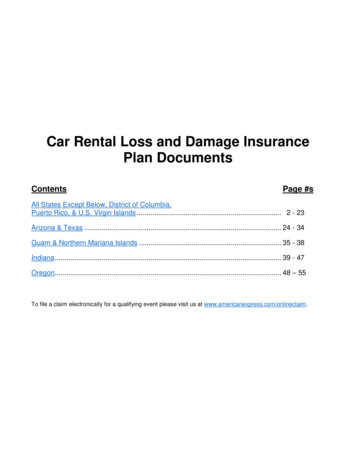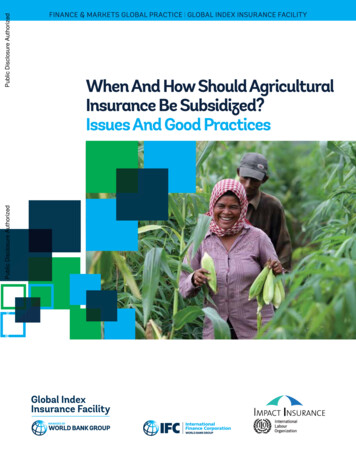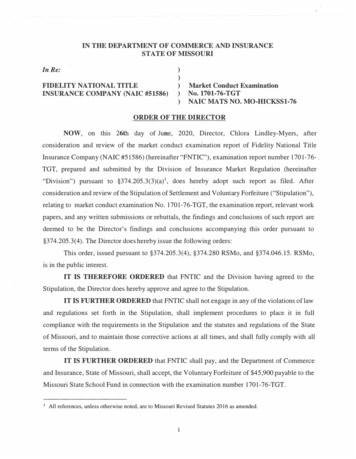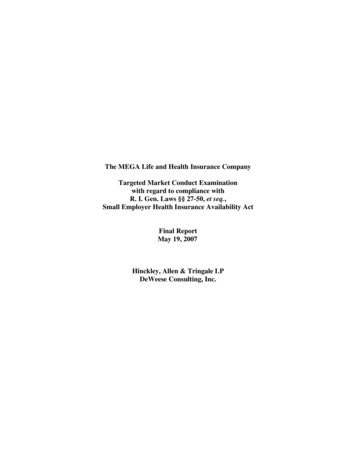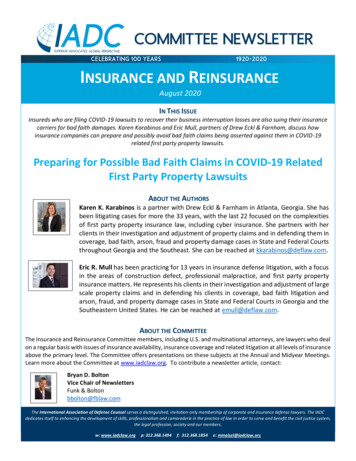
Transcription
INSURANCE AND REINSURANCEAugust 2020IN THIS ISSUEInsureds who are filing COVID-19 lawsuits to recover their business interruption losses are also suing their insurancecarriers for bad faith damages. Karen Karabinos and Eric Mull, partners of Drew Eckl & Farnham, discuss howinsurance companies can prepare and possibly avoid bad faith claims being asserted against them in COVID-19related first party property lawsuits.Preparing for Possible Bad Faith Claims in COVID-19 RelatedFirst Party Property LawsuitsABOUT THE AUTHORSKaren K. Karabinos is a partner with Drew Eckl & Farnham in Atlanta, Georgia. She hasbeen litigating cases for more the 33 years, with the last 22 focused on the complexitiesof first party property insurance law, including cyber insurance. She partners with herclients in their investigation and adjustment of property claims and in defending them incoverage, bad faith, arson, fraud and property damage cases in State and Federal Courtsthroughout Georgia and the Southeast. She can be reached at kkarabinos@deflaw.com.Eric R. Mull has been practicing for 13 years in insurance defense litigation, with a focusin the areas of construction defect, professional malpractice, and first party propertyinsurance matters. He represents his clients in their investigation and adjustment of largescale property claims and in defending his clients in coverage, bad faith litigation andarson, fraud, and property damage cases in State and Federal Courts in Georgia and theSoutheastern United States. He can be reached at emull@deflaw.com.ABOUT THE COMMITTEEThe Insurance and Reinsurance Committee members, including U.S. and multinational attorneys, are lawyers who dealon a regular basis with issues of insurance availability, insurance coverage and related litigation at all levels of insuranceabove the primary level. The Committee offers presentations on these subjects at the Annual and Midyear Meetings.Learn more about the Committee at www.iadclaw.org. To contribute a newsletter article, contact:Bryan D. BoltonVice Chair of NewslettersFunk & Boltonbbolton@fblaw.comThe International Association of Defense Counsel serves a distinguished, invitation-only membership of corporate and insurance defense lawyers. The IADCdedicates itself to enhancing the development of skills, professionalism and camaraderie in the practice of law in order to serve and benefit the civil justice system,the legal profession, society and our members.w: www.iadclaw.orgp: 312.368.1494f: 312.368.1854e: mmaisel@iadclaw.orgI. INTRODUCTION
-2-INSURANCE AND REINSURANCE COMMITTEE NEWSLETTERAugust 2020As observed from the numerous COVID-19first party property cases that have alreadybeen filed, insureds are claiming insurershave denied their business interruptionclaims in bad faith. Whether the applicablejurisdiction limits bad faith damages viastatute or allows such damages consistentwith punitive damages, insurers must ensuretheir adjusters are handling these COVID-19claims in good faith.In a recent COVID-19 related case, a badfaith claim was asserted along with a breachof contract claim in Big Onion Tavern Group,LLC, et al. v Society Ins. Co. (No. 120-cv02005), filed in the United States DistrictCourt for the Northern District of Illinois. Theplaintiffs in Big Onion are separatebusinesses that operate in the Chicago areaand had in place business interruptioninsurance from Society Insurance. The basisof the plaintiff’s claims in Big Onion originatewith Illinois Governor J.B. Pritzker’s March15, 2020 order closing all restaurants, bars,movie theaters, etc. to help stop the spreadof COVID-19. The suit seeks coverage undertheplaintiffs’commercialbusinessinsurance policies, “which provide coveragefor losses incurred due to a ‘necessarysuspension’ of their operations, includingwhen their business are forced to close dueto a government order.” Further, the suitasserts that the Society Insurance policypromises to cover their losses when thegovernment forces closure interruption oftheir businesses and does not excludecontamination due to communicabledisease and/or viruses.w: www.iadclaw.orgp: 312.368.1494Concerning their bad faith claim, theplaintiffs in Big Onion allege that SocietyInsurance issued blanket denials of theirclaim for business interruption losses thatresulted from the governor’s closure order“often within hours of receiving Plaintiffs’claims – without first conducting anymeaningful coverage investigation, let alonea ‘reasonable investigation based on allavailable information’ as required underIllinois law.” Further, the suit provides thatSociety Insurance COE Rick Parks issued amemorandum to “agency partners”providing that under Illinois law, the SocietyInsurance policies would likely not coversuch stoppages. The memorandum provides(in pertinent part):Whether it be a full shutdown ofbusiness, a partial suspension ofoperations or an alteration in businessoperations that remain open, BusinessIncome coverage must be due to asuspension caused by direct physicalloss of or damage to covered propertyat the described premises. The loss ordamage must be caused by or resultfrom a Covered Cause of Loss. ExtraExpense coverage also requires thesame coverage triggers. In general, aquarantine of any size, or broughtabout by a governmental actionwithout a Covered Cause of Loss,would likely not trigger BusinessIncome or Extra Expense coveragesunder our policies.Similarly, in Treasure Island, LLC v. AffiliatedFM Insurance Company, (No. 2:20-cvf: 312.368.1854e: mmaisel@iadclaw.org
-3-INSURANCE AND REINSURANCE COMMITTEE NEWSLETTERAugust 202000965), filed in the United States DistrictCourt for Nevada, the insured, a casino andresort, alleges that its insurer denied itsclaim for business interruption losses in badfaith by failing to conduct an adequate andproper investigation. Central to the bad faithclaim is a copy of “Talking Points” that AFMreportedly prepared for its adjusters “toensure that AFM’s adjusters reach the sameconclusion for all COVID-19 claims.”Treasure Island alleges that the “TalkingPoints” failed to include all of the different“triggers” of coverage that might be involvedin responding to COVID-19 claims.coronavirus on its premises. After the claimwas denied, the insured filed suit seekingcoverage and bad faith damages, allegingthat its carrier “formally denied the claim onMarch 30, 2020 without conducting anysubstantive investigation into the claim. Theinsurance company did not attempt toinspect the premises, nor did they requestany photographs or send out any experts orfield adjusters to evaluate the claim.” Assuch, the insured alleges that these actionsconstituted “willful, wanton, immoral,unlawful, malicious and/or deceptive claimshandling practices.”At the outset of the memorandum, the“Talking Points” dispels any notion thatmemorandum will address all coverageissues. The memorandum provides that it“will not deal with all the issues associatedwith [COVID-19 claims], but will be helpful inproviding responses to basic questions as itrelates to the coverage provided by [AFM’s]policies.” The document goes on to listsample questions and answers to generalcoverage questions. Treasure Island claimsthat the answers contradict the specificcoverage provisions contained in its policy asinterpreted by Nevada law.The claims-handling and bad faithallegations in Big Onion, Treasure Island, andMace Marine illustrate the importance ofconducting a diligent investigation into eachclaim, regular communication with insureds,and the implications of preparing blanketstatement suggesting the lack of coverageprior to receiving and reviewing actualclaims.Finally, bad faith allegations are alsoasserted in Mace Marine Inc. v. Tokio MarineSpecialty Insurance Co. (4:2020-cv-10044),which is pending in the United States DistrictCourt for the Southern District of Florida. InMace Marine, the insured, a dive shop, fileda claim with its carrier asserting that itsuffered a direct physical loss to propertydue to the potential presence of thew: www.iadclaw.orgp: 312.368.1494An insurance company will have a difficulttime defending a bad faith claim if thecoverage decision is made quickly andwithout any investigation. The insurer’sinvestigation must be a reasonable one, butwhat does a reasonable investigation looklike? The investigation must include aninterview of the insured, gathering the factsof the claim, and a request fordocumentation, if needed. The facts of theclaim must be evaluated in light of theapplicable policy provisions, and the claimfile should document the details of thatevaluation. The bad faith allegations inf: 312.368.1854e: mmaisel@iadclaw.org
-4-INSURANCE AND REINSURANCE COMMITTEE NEWSLETTERAugust 2020Treasure Island demonstrate how even aninternal memorandum prepared for aninsurer’s adjusters can be misconstrued asan effort by the carrier to tigating the facts of an insured’s claimand applying the particular coveragesafforded under the insured’s policy.Having defended numerous bad faith claimsover the years, we have found thatpracticing good customer relations is one ofthe keys to avoid bad faith. Insureds want tobe kept in the loop of what is going on withtheir claims. Return an insured’s call, even ifthere is no new information to provide.Customer service, however, is not the onlykey to avoiding bad faith.Insureds also want someone who isknowledgeable of the provisions of theirpolicy. Adjusters must know the applicablepolicy inside and out. This is especially truein connection with any COVID-19 relatedclaims that may be filed. The insureds likelydo not understand how the provisions of thepolicy might or might not cover any businessinterruption claims. Any confusion on thepart of the adjuster or misinterpretation ofthe policy provisions will be seen by insuredsas an attempt by the insurer to deny theirclaim in bad faith.Following these pointers will not prevent aninsured from filing a bad faith claim, butthese pointers, if followed, may prevent ajury from assessing bad faith damagesagainst the insurance company.w: www.iadclaw.orgp: 312.368.1494f: 312.368.1854e: mmaisel@iadclaw.org
-5-INSURANCE AND REINSURANCE COMMITTEE NEWSLETTERAugust 2020Past Committee NewslettersVisit the Committee’s newsletter archiveonline at www.iadclaw.org to read otherarticles published by the Committee. Priorarticles include:JULY 202010th Circuit Creates Opportunity forLiability Insurers to Hedge Their BetsAgainst Future Bad Faith Litigation in Claimswith Questionable CoverageEric R. Mull and Katelyn E. FischerJUNE 2020COVID-19 Business Interruption InsuranceClaims Coverage IssuesDoug Vaughn and Frank BarryCourt Cuts Off Oxygen to AutoeroticAsphyxiation Insurance ClaimGary L. HowardMAY 2020Duty to Defend, Duty to Indemnify Duty toSettle? Results-Oriented Decision inMassachusetts Confuses Carriers, SowsConfusionAlexander G. HenlinAPRIL 2020Insurance Policies without Limits: MorePitfalls for UnderwritersHarmon C. HaydenFEBRUARY 2020Toeing the Line: When Professional Servicesare not Professional ServicesMatthew S. Brown and Bryan M. PritikinJANUARY 2020Seepage or Leakage: What Coverage Existsfor the First 13 Days?Karen K. KarabinosDECEMBER 2019Georgia Court Takes Bright-Line Approachto Question of When Liability Insurer Has aDuty to Settle, Thereby Limiting Insurers’Potential Bad Faith Exposure Where NoFormal Settlement Demand within PolicyLimits Has Been MadeEric R. Mull and Katelyn E. FischerNOVEMBER 2019New ALI Restatement on Liability InsuranceDraws CriticismMark Behrens and Christopher E. AppelTravel Medical Insurance and Perils of BadFaith ClaimsHarmon C. HaydenMARCH 2020Texas Supreme Court to Decide Two EightCorner Duty to Defend Cases This TermBob Allenw: www.iadclaw.orgp: 312.368.1494f: 312.368.1854e: mmaisel@iadclaw.org
asserted in Mace Marine Inc. v. Tokio Marine Specialty Insurance Co. (4:2020-cv-10044), which is pending in the United States District Court for the Southern District of Florida. In Mace Marine, the insured, a dive shop, filed a claim with its carrier asserting that it suffered a direct physical loss to property
